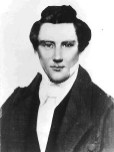
FAIR is a non-profit organization dedicated to providing well-documented answers to criticisms of the doctrine, practice, and history of The Church of Jesus Christ of Latter-day Saints.
Contents |
| Answers portal |
| Joseph Smith, Jr. |

|
|
|
|
|
==
To see citations to the critical sources for these claims, click here
==
LDS scholar Daniel C. Peterson notes,
[I]n order to pay for their farm, the Smiths were obliged to hire themselves out as day laborers. Throughout the surrounding area, they dug and rocked up wells and cisterns, mowed, harvested, made cider and barrels and chairs and brooms and baskets, taught school, dug for salt, worked as carpenters and domestics, built stone walls and fireplaces, flailed grain, cut and sold cordwood, carted, washed clothes, sold garden produce, painted chairs and oil-cloth coverings, butchered, dug coal, and hauled stone. And, along the way, they produced between one thousand and seven thousand pounds of maple sugar annually. "Laziness" and "indolence" are difficult to detect in the Smith family.[1]
The data shows that the Smith farm increased in value beyond something like 90% of their neighbors. How did they manage this without doing farm work? These are physical improvements. They were too poor to pay someone else to do it. So, are we to believe that Joseph's family let Joseph just sit around doing his "magic business" while the rest of them worked their fingers to the bone?
What did Joseph's associates have to say about Joseph's work? Former neighbor Orlando Saunders recalled,
They were the best family in the neighborhood in case of sickness; one was at my house nearly all the time when my father died....[The Smiths] were very good people. Young Joe (as we called him then), has worked for me, and he was a good worker; they all were. . . . He was always a gentleman when about my place."[2]
- John Stafford, eldest son of William Stafford said that the Smiths were "poor managers," but allowed as how Joseph "would do a fair day's work if hired out to a man...."[3]
According to Truman G. Madsen,
Mrs. Palmer, a non-Mormon who lived near the Smith farm in Palmyra, said of Joseph that "her father loved young Joseph Smith and often hired him to work with his boys. She was about six years old, she said, when he first came to their home. . . .She remembered, she said, the excitement stirred up among some of the people over the boy's first vision, and of hearing her father contend that it was only the sweet dream of a pure-minded boy.” [4]
According to a contemporary, Martha Cox,
She stated that one of their church leaders came to her father to remonstrate against his allowing such close friendship between his family and the "Smith boy," as he called him. Her father, she said, defended his own position by saying that the boy was the best help he had ever found. [5]
Joseph's brother William noted that derogatory comments about Joseph's character came only after he reported his visions,
We never heard of such a thing until after Joseph told his vision, and not then, by our friends. Whenever the neighbors wanted a good day's work done they knew where they could get a good hand and they were not particular to take any of the other boys before Joseph either… Joseph did his share of the work with the rest of the boys. We never knew we were bad folks until Joseph told his vision [6]
Joseph Knight said that Joseph Smith, Jr. was “the best hand [my father] ever hired” [7]
==

FAIR is a non-profit organization dedicated to providing well-documented answers to criticisms of the doctrine, practice, and history of The Church of Jesus Christ of Latter-day Saints.
We are a volunteer organization. We invite you to give back.
Donate Now